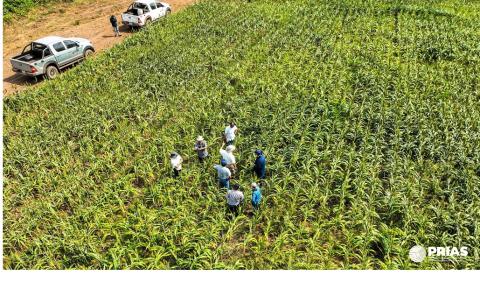Deforestation threatens the Chiquitano, Cerrado, Chaco, and Amazon ecosystems in Bolivia. The accelerated conversion of natural forests to agricultural pasture is leading to deforestation and several more negative impacts such as the multiplication of pests and the degradation of soil. The deforestation of large plots of land is leading to an increase in average temperatures, changing rainfall regimes, longer and more intense winter droughts and shortening summer rains. Soil degradation occurring from the overgrazing of pastures and agrochemicals can disturb the natural processes of water filtration and result in economic and ecological damages.
It is clear that agricultural practices must change to better protect the natural resources upon which they depend. To address this deforestation and soil degradation, Conservation Strategy Fund (CSF), along with our partners Foundation for the Conservation of the Chiquitano Forest (FCBC) and Consorcio Regional de Experimentación Agropecuaria (CREA) will promote regenerative agriculture practices through a pilot project with a group of farmers in Bolivia.
The farmers participating in our project will come from a variety of regions with different soil conditions, and our recommendations will support their transition to a more sustainable approach to soy and cattle farming in Bolivia's Chiquitano, Cerrado, Chaco, and Amazon ecoregions.
Our strategy is to increase yields in agricultural areas through the use of regenerative farming practices, by using and disseminating technical knowledge about sustainable practices, such as the recovery of degraded soils and reducing the use of chemical pesticides, in order to avoid future deforestation. Thirty to 40 farms are expected to participate in the project, for a total area of approximately 1,000 hectares.
The use of regenerative farming techniques is expected to contribute to improved soil fertility, greater resilience to adverse weather conditions and resistance to pests, better water infiltration and retention, and especially increased soil carbon sequestration. The practices proposed will include the use of service crops, repopulation of soils with a microbiota that gradually restores life and health to soils.
Although there is a transition period in which immediate results cannot be expected from the recovery practices, it is expected that CSF’s economic analysis will prove that regenerative practices of agriculture and cattle can lead to a more profitable and sustainable system, in the medium and long term, than a conventional one.
This would be the main incentive for farmers participating in the project to increase the practices in their crops and ranching areas, and for new farmers to introduce regenerative practices in their lands.
By promoting regenerative agriculture practices through pilot experiments with groups of producers in different soil conditions we expect to scale up the results to other rural properties in the region. The broader goal is to achieve more sustainable soy and meat production systems, in order to reduce the need to deforest new areas as a growth strategy.
Methodology
The CSF team will carry out an economic and financial analysis of the processes to evaluate the practices’ costs and benefits in terms of financial gains for farmers. Quantitative improvements can mean increased yields per hectare of any type of crop, including soybeans, thus reducing pressures to clear new farmland. The analysis will be based on the comparison of treatment and control plots of lands within agricultural and cattle farms. In addition to the financial analysis, the ecosystem services related to improved soils will be measured in order to quantify the benefits related to the regenerative agricultural practices.
Dissemination
The engagement of agricultural associations, farmers, and decision makers throughout the supply chain is one of the project's key components. Through CREA's direct participation, the project aims to disseminate production and economic benefits from the use of regenerative practices among farming communities by systematizing data and announcing results in publications, seminars, field events, and workshops. The proposal is to disseminate more technical knowledge and win farmers over to agricultural practices that combine higher yields with sustainability, enhance biodiversity, and mitigate climate change.
Read more about this project from our partners the Land Innovation Fund in this article.
This project is supported by the Land Innovation Fund.
Photo Credit: PRIAS Project


